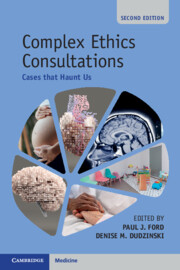Book contents
- Complex Ethics Consultations
- Reviews
- Complex Ethics Consultations
- Copyright page
- Contents
- Additional Contributors to the Second Edition
- Contributors to the First Edition (Original Biographies from the First Edition)
- Foreword to the First Edition
- Acknowledgments
- Introduction
- Introduction to the First Edition
- Part I Starting at the Beginning
- Part II The Most Vulnerable of Us
- Part III Diversity of Desires and Limits of Liberty
- Chapter 9 Helping Staff Help a “Hateful” Patient
- Chapter 10 Ulysses Contract
- Chapter 11 Misjudging Needs
- Chapter 12 When the Patient Refuses to Eat
- Commentary 3 Reflections on Part III
- Part IV Withholding Therapy with a Twist
- Part V The Unspeakable/Unassailable
- Part VI Human Guinea Pigs and Miracles
- Part VII The Big Picture:
- Conclusions, Educational Activities, and References (Revised for Second Edition)
- Index
- References
Commentary 3 - Reflections on Part III
from Part III - Diversity of Desires and Limits of Liberty
Published online by Cambridge University Press: 17 May 2025
- Complex Ethics Consultations
- Reviews
- Complex Ethics Consultations
- Copyright page
- Contents
- Additional Contributors to the Second Edition
- Contributors to the First Edition (Original Biographies from the First Edition)
- Foreword to the First Edition
- Acknowledgments
- Introduction
- Introduction to the First Edition
- Part I Starting at the Beginning
- Part II The Most Vulnerable of Us
- Part III Diversity of Desires and Limits of Liberty
- Chapter 9 Helping Staff Help a “Hateful” Patient
- Chapter 10 Ulysses Contract
- Chapter 11 Misjudging Needs
- Chapter 12 When the Patient Refuses to Eat
- Commentary 3 Reflections on Part III
- Part IV Withholding Therapy with a Twist
- Part V The Unspeakable/Unassailable
- Part VI Human Guinea Pigs and Miracles
- Part VII The Big Picture:
- Conclusions, Educational Activities, and References (Revised for Second Edition)
- Index
- References
Summary
The series of cases discussed in Part III are humbling reminders of how intertwined our patients and their support systems are with healthcare practitioners. TJ, Jimmy, Mrs. Blue, and Mrs. Winthorpe all have unique experiences in different corners of the healthcare system. Each case touches on the familiar experience of a healthcare team identifying what they believe is in the best interest of patient, and there being a factor, often the patient themselves, complicating that coming to fruition. Their experiences, and different experiences of privilege and power, or disempowerment are salient elements of their stories. These “haunting” and morally distressing cases are revisited with an additional lens of diversity, equity, identity, and bias and considerations for how ethicists might more fully integrate these critical perspectives into ethics consultation.
Information
- Type
- Chapter
- Information
- Complex Ethics ConsultationsCases that Haunt Us, pp. 102 - 108Publisher: Cambridge University PressPrint publication year: 2025
